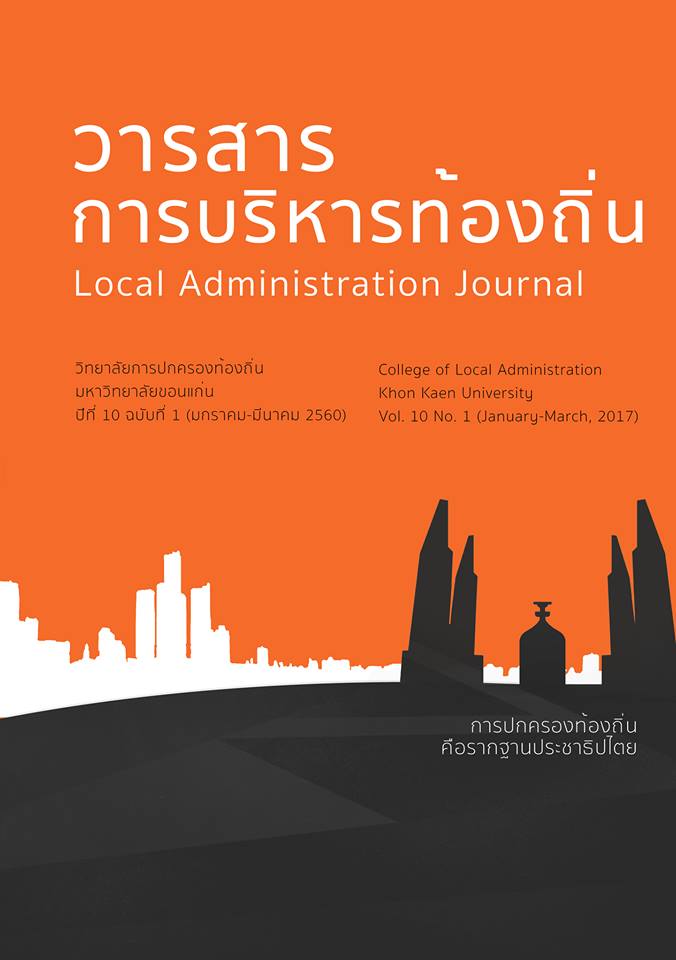การแปรรูปรัฐวิสาหกิจในประเทศไทย กรณีศึกษาโรงงานยาสูบ กระทรวงการคลัง
Keywords:
โรงงานยาสูบ, การแปรรูป, รัฐวิสาหกิจ, ผลกระทบ, Tobacco Factory, Privatization, Pubic Enterprises, ImpactAbstract
การวิจัยครั้งนี้มีวัตถุประสงค์เพื่อ 1) ศึกษาแนวทางการแปรรูปโรงงานยาสูบ 2) เพื่อศึกษาความคิดเห็นของผู้แทนสหภาพแรงงานเกี่ยวกับการแปรรูปโรงงานยาสูบ และ 3) เพื่อศึกษาผลกระทบต่อรัฐ ตัวแทนจำหน่าย และประชาชนจากการแปรรูปโรงงานยาสูบ ผู้ให้ข้อมูลหลักในงานวิจัยนี้ ได้แก่ ตัวแทนสหภาพแรงงาน พนักงาน ตัวแทนจำหน่าย และประชาชนผู้ที่สูบบุหรี่ ในการเก็บรวบรวมข้อมูลใช้วิธีการสัมภาษณ์เชิงลึกจากผู้ให้ข้อมูลหลัก จำนวน 20 คน
ผลการวิจัยพบว่า 1) การแปรรูปโรงงานยาสูบจะเกิดขึ้นได้ในรูปแบบของการให้เอกชนร่วมลงทุนในกิจการของภาครัฐ (Public Private Partnership) 2) ตัวแทนสหภาพแรงงาน มีความคิดเห็นที่ไม่ต่อต้านการแปรรูปโรงงานยาสูบ ในขณะที่พนักงานในส่วนภูมิภาคเห็นด้วยกับแปรรูปโรงงานยาสูบ เพราะอาจจะทำให้เกิดผลดีในเรื่องของการบริหารจัดการในส่วนภูมิภาค อย่างไรก็ตาม หากมีการแปรรูปจะต้องไม่กระทบต่อความมั่นคงในหน้าที่การงาน ค่าตอบแทนและสวัสดิการที่พนักงานได้รับในปัจจุบัน 3) ตัวแทนจำหน่ายยาสูบหรือบุหรี่ และประชาชนทั่ว ๆ ไปมองว่า หากมีการแปรรูปโรงงานยาสูบจริง จะทำให้เกิดการเพิ่มประสิทธิภาพในการผลิตของโรงงานยาสูบเพื่อการแข่งขันและขยายไปยังตลาดต่างประเทศ ขณะเดียวกันเงินลงทุนที่เพิ่มขึ้นจากภาคเอกชนจะส่งผลให้รัฐมีรายได้เพิ่มขึ้น ทำให้รัฐมีงบประมาณที่จะนำไปใช้ในการพัฒนาทางด้านอื่นของประเทศมากขึ้น อีกทั้งการขยายตัวไปยังตลาดในต่างประเทศจะส่งผลทางอ้อมให้เกษตรกรสามารถผลิตและมีรายได้จากการปลูกยาสูบมากขึ้น ข้อเสนอแนะในงานวิจัยครั้งนี้คือ ควรมีการประชาสัมพันธ์ให้พนักงานได้เกิดความมั่นใจว่าหากมีการแปรรูปแล้วจะไม่มีผลกระทบต่อค่าตอบแทนและสวัสดิการที่ได้รับในปัจจุบัน
Privatization of State Enterprise in Thailand: A Case Study of Thailand Tobacco Monopoly, Ministry of Finance
The objectives of this research are: 1) to study the guidelines of privatizing the Thailand Tobacco Monopoly (TTM); 2) to examine TTM workers union’s responses to the plan for privatizing TTM; and 3) to study the impacts of this privatization on the State, distributers, and the public. The data employed in this study were collected from 20 key informants comprised of TTM’s workers union representatives, employees, distributors, and consumers. The method of data collection was in-depth interviews. The results indicated that:
1) It is possible to privatize the TTM by Public Private Partnership (PPP).
2) The TTM workers union did not resist the privatization of TTM while the TTM local workers agree of the privatization idea because they hope it will be better off. However, they expressed their concern about their employment security and would agree to the privatization plan only if they had more benefits and their salaries were adjusted to a higher scale.
3) The distributors of tobacco products and the general public expressed a view that privatization of TTM Monopoly would increase efficiency in the production and competitiveness of TTM, resulting in business expansion and increased product export to other countries. This would help increase the revenue for the national coffers, making it possible for the government to allocate more budgets for national development. At the same time, the expansion of markets in other countries would increase the tobacco production, thus increasing farmers’ income.
Downloads
Published
How to Cite
Issue
Section
License
The copyright of all articles published in the Local Administration Journalis owned by the College of Local Administration, Khon Kaen University.



